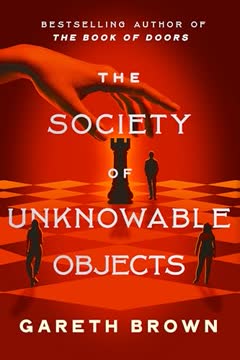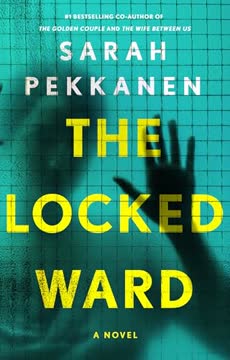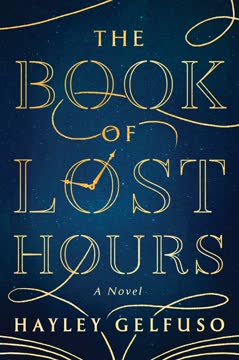Plot Summary
The Atlas of Lost Things
Imelda Sparks, an artist and mother, embarks on a solo adventure across continents, guided by a magical, ever-shifting map called The Atlas of Lost Things. Her journey is a search for rare magical artefacts, each with mysterious powers, to add to the secretive Society's collection. In the Nevada desert, she senses she's close to her goal, but a strange, unsettling man appears, making her feel seasick and threatened. In a moment of panic, Imelda falls to her death, her quest unfinished. This opening sets the tone: magic is real, dangerous, and hidden, and the cost of seeking it can be fatal. Imelda's love for her daughter Magda and her sense of adventure are palpable, but so is the lurking threat that magic brings.
The Secret Society Below
Magda Sparks, Imelda's daughter, is drawn into the world her mother left behind. The heart of this world is Bell Street Books, a cozy London bookshop with a secret: beneath it lies the meeting place of the Society of Unknowable Objects. The Society's purpose is to collect, protect, and hide magical artefacts from the world. Magda, now a novelist, joins Frank Simpson (the fatherly shop owner) and Will Pinn (a reclusive watchmaker) in the Society. The group is shaken when Frank calls an extraordinary meeting—something that hasn't happened in decades. A new magical item, an ivory chess rook, has surfaced in Hong Kong, and Magda volunteers to retrieve it, setting the main plot in motion.
A Rook in Hong Kong
Magda travels to Hong Kong, where she meets James Wei, a charming art curator whose late father was connected to the Society. Over noodles and city walks, Magda and James bond, both personally and through their shared sense of wonder about magic. James reveals he's found a chess piece among a wealthy banker's bequeathed items—a rook that feels "wrong" and heavy, likely an artefact. As Magda inspects it, she's convinced it's genuine. But their meeting is interrupted by a gaunt, cold-eyed man with a gun, who kills James and demands the artefact. Magda narrowly escapes by using her own secret: a pendant that lets her fly, inherited from her mother. The encounter is traumatic, and the chess piece's danger is made real.
The Man with the Gun
Owen Maddox, a former British military sniper turned contract killer, is revealed as the man hunting magical artefacts. He possesses a magical flask that lets him see people's souls as colored wings, and he's addicted to the power it gives him. Maddox uses a magical map to track artefacts, ruthlessly killing anyone in his way. His pursuit of Magda and the chess piece is relentless, and he's willing to kill to get what he wants. The Society's rules and secrecy are tested as Maddox's violence brings the hidden magical world into deadly conflict with the mundane one.
The Impossible Box
Back in London, Magda returns traumatized, only to find the Society in turmoil. Henrietta ("Henry"), a former member with a ghost ring that lets her walk through walls, reveals that the Society's famed Clockwork Cabinet is empty—a ruse. The real collection is hidden in the Impossible Box, a magical container that can hold anything, no matter its size, and can only be opened by those who know what's inside. Frank, the Society's leader, confesses to keeping secrets to protect the world from the artefacts' dangers. The Society's history is revealed to be one of theft, lies, and moral compromise, and Magda's trust in Frank is shaken.
The Ghost Ring's Truth
Henry's ghost ring allows her to uncover the Society's secrets, and she exposes Frank's lies about the Society's origins and the true nature of the artefacts. The Society's founders were not noble guardians but opportunists who used magic for personal gain. The group is fractured by these revelations, and Will, overwhelmed by the danger and duplicity, quits. Meanwhile, the chess piece's power is discovered: it can control people like chess pieces on a board. The Society's purpose and methods are called into question, and Magda is forced to confront the cost of secrecy and the temptation of using magic.
The Book of Wonders
A pivotal secret is revealed: the Society's most powerful artefact is not an object, but a book—the Book of Wonders. This magical book can create new artefacts simply by writing a description in it. All the Society's artefacts, including the Impossible Box, the ghost ring, and the chess piece, were created this way. The book's power is immense and dangerous, and only some people can use it. Imelda had used it to create the Atlas of Lost Things, and the book's existence explains the proliferation of magical items. The book's potential for good or evil is limitless, and it becomes the ultimate prize in the struggle for control.
Lukas, The Living Artefact
A new, unsettling figure emerges: Lukas, a man who is himself a magical artefact, created by the Book of Wonders as "a child that will live." Lukas cannot die, is immune to harm, and is drawn to magical items. He is childlike, lonely, and fundamentally "wrong"—people feel ill in his presence. Lukas possesses artefacts from Imelda's bag, including the crucifix (which can resurrect the dead), and uses them without understanding their consequences. He is both victim and threat, seeking connection but causing chaos. His existence forces the Society to confront the ethics of magic and the unintended consequences of their actions.
Resurrection and Ruin
Lukas's use of the crucifix leads to horrifying results: he repeatedly resurrects Imelda, breaking her mind and body, and creates a garden of monstrous flowers and resurrected animals. Owen Maddox, seeking revenge and power, confronts Lukas in Alabama, but is defeated by Lukas's control over the earth and the dead. The Society, scattered and traumatized, struggles to contain the fallout. Magda, wracked with guilt and grief, realizes that magic cannot be controlled or used without cost. The world is on the brink of exposure to magic, and the Society's old ways are no longer sufficient.
The Roses of Bell Street
Lukas, now in possession of the Book of Wonders and the Impossible Box, comes to London, transforming Bell Street into a nightmare of magical roses and wild growth. The city is paralyzed by the magical chaos, and the Society is powerless. Lukas demands that Magda use the Book to create another being like him, so he won't be alone. Magda, desperate and clever, tricks Lukas into shaking her hand and pushes him into the Impossible Box, containing him like any other artefact. The magical chaos subsides, but the cost is high: Frank dies, and the Society is forever changed.
Betrayal and Containment
Magda's betrayal of Lukas—tricking him into the Impossible Box—haunts her. She is left to grapple with the morality of her actions: was it right to imprison a sentient being, even one as dangerous as Lukas? The Society's members are traumatized, and the world is left with scars from the magical events. The Impossible Box, now containing Lukas and all the artefacts, is hidden away, and the Book of Wonders is secured. The survivors must decide what kind of Society they will build from the ashes of the old one.
The End of Frank Simpson
Frank, the Society's leader and Magda's surrogate father, dies in the aftermath of the magical battle. His death marks the end of an era and forces Magda to step into leadership. Frank's letter reveals the true history of the Society, his regrets, and his hopes for Magda. The funeral is a moment of reckoning for all the characters, and the question of what to do with magic—and with the Society itself—remains unresolved. Magda is left with grief, responsibility, and the challenge of forging a new path.
A New Society Forms
In the wake of Frank's death, Magda gathers the remaining members—Will, Henry, and James—and proposes a new Society, one built on transparency, shared responsibility, and a commitment to protecting the world from magic's dangers. The group is hesitant but agrees to try. The Impossible Box and the Book of Wonders are secured, and the Society's future is uncertain but hopeful. Magda and James begin a relationship, and the bookshop is renamed Frank's Books in honor of their mentor. The story ends with the sense that magic, like life, is both wondrous and perilous, and must be handled with care.
The Fox Library Visitor
Months later, Magda is visited in her bookshop by a mysterious American woman named Cassie, who hints at knowledge of magical books and a place called the Fox Library. Cassie's appearance suggests that the world of magic is larger and stranger than the Society ever knew, and that new adventures—and new dangers—await. The story closes with Magda, now wiser and more cautious, ready to face whatever comes next, surrounded by friends and the memory of those she's lost.
Characters
Magda Sparks
Magda is the emotional and narrative heart of the story—a novelist, daughter, and inheritor of the Society's legacy. Raised by her adventurous mother Imelda, Magda is both curious and cautious, drawn to magic's wonder but haunted by its dangers. Her journey is one of self-discovery, as she moves from outsider to leader, forced to make impossible choices. Magda's relationships—with Frank (her surrogate father), Henry (her rebellious friend), Will (the anxious watchmaker), and James (her romantic partner)—reveal her empathy, loyalty, and capacity for growth. Her greatest challenge is moral: can she do what's necessary to protect the world, even if it means betraying her own ideals? By the end, Magda is changed—wiser, sadder, but still hopeful.
Frank Simpson
Frank is the aging chair of the Society, owner of Bell Street Books, and a surrogate father to Magda. He is defined by his sense of duty and his burden of secrets—he has lied to protect the world from magic, but also to control it. Frank's history is one of compromise: he reformed the Society after its founders' abuses, but his methods are paternalistic and opaque. He is both loving and frustrating, a man who wants to do good but is haunted by guilt and fear. Frank's death is the story's emotional climax, forcing the next generation to confront the consequences of his choices and to build something better.
Henrietta "Henry" Wiseman
Henry is the Society's most irreverent and independent member, possessing a ghost ring that lets her become intangible. She is charismatic, witty, and unafraid to challenge authority—especially Frank's. Henry's psychoanalysis reveals a deep need for autonomy and a distrust of institutions, born from her family's history of using magic for personal gain. She is both a burglar and a moral compass, pushing the group to confront uncomfortable truths. Her relationship with Magda is complex—part mentor, part rival, part friend. Henry's willingness to help, despite her reservations, is a testament to her loyalty and her belief in doing what's right, even if it means breaking the rules.
Will Pinn
Will is the Society's most reluctant member, a watchmaker who hates magic and craves order. He is introverted, precise, and deeply uncomfortable with the unpredictability of the magical world. Will's relationship with his father—a former Society member who broke the rules—shapes his fear of responsibility and his desire to escape. He is the group's conscience, always questioning the wisdom of their actions and the morality of using magic. Will's development is subtle: he never fully embraces the Society, but his loyalty to Magda and his sense of duty keep him involved. He represents the ordinary person's perspective—the fear, skepticism, and longing for normalcy in a world gone mad.
James Wei
James is an art curator from Hong Kong, the son of a man saved by the Society's magic. He is warm, witty, and open-minded, quickly forming a bond with Magda. James's magical artefact—a pill bottle that grants perfect health—makes him both a beneficiary and a symbol of magic's potential for good. His outsider status allows him to see the Society's flaws and strengths with fresh eyes. James's resilience, kindness, and willingness to risk everything for Magda make him an essential part of the new Society. His romance with Magda is a source of hope and healing in the aftermath of trauma.
Owen Maddox
Owen is the story's primary antagonist—a former sniper and government assassin turned magical artefact hunter. He is ruthless, cunning, and addicted to the power of his magical flask, which lets him see people's souls. Owen's psychoanalysis reveals a man shaped by violence, trauma, and a desperate need for control. He is both a threat to the Society and a victim of magic's corrupting influence. His pursuit of artefacts is relentless, and his willingness to kill without remorse makes him a dark mirror to the Society's ideals. Owen's defeat at the hands of Lukas is both a comeuppance and a warning: magic attracts the worst as well as the best.
Lukas
Lukas is the most complex and unsettling character—a man created by magic, unable to die, fundamentally "wrong" in the eyes of others. He is childlike, lonely, and desperate for connection, but his actions—resurrecting the dead, causing chaos—are catastrophic. Lukas's psychoanalysis reveals the dangers of unchecked power and the unintended consequences of magical creation. He is both a victim and a threat, embodying the story's central question: what responsibility do creators have for their creations? Lukas's fate—imprisoned in the Impossible Box—raises profound ethical questions about agency, suffering, and the limits of compassion.
Imelda Sparks
Imelda is the story's absent presence—her death sets the plot in motion, and her legacy shapes Magda's journey. She is adventurous, loving, and resourceful, but her pursuit of magic leads to tragedy. Imelda's journals and artefacts are the keys to understanding the Society's history and the dangers of magic. Her resurrection at Lukas's hands is a horror, a reminder that some boundaries should not be crossed. Imelda's love for Magda and her sense of wonder are the story's emotional core, and her absence is felt in every choice Magda makes.
The Book of Wonders
Though not a person, the Book of Wonders is a character in its own right—a magical artefact that can create other artefacts, limited only by the imagination and intent of its user. The book's psychoanalysis is that of a genie: it grants wishes, but with unpredictable and often dangerous consequences. Its existence raises questions about creativity, responsibility, and the nature of power. The book is both a blessing and a curse, and its fate is central to the story's resolution.
Cassie / The Fox Library
Cassie appears only at the end, but her presence is significant. She is an American woman with knowledge of magical books and a connection to the Fox Library, a place hinted to be a nexus of magical knowledge. Cassie's psychoanalysis is that of the guide or mentor, offering help and opening doors to new possibilities. Her appearance suggests that the world of magic is far larger and stranger than the Society ever imagined, and that Magda's story is only beginning.
Plot Devices
The Magical Artefact Hunt
The central plot device is the search for and protection of magical artefacts—ordinary items imbued with unique, often dangerous powers. Each artefact is a plot catalyst, driving characters into conflict, alliance, and self-discovery. The artefacts' powers are both literal (flight, resurrection, control) and metaphorical (temptation, responsibility, legacy). The hunt for artefacts is also a hunt for meaning, identity, and redemption.
The Secret Society Structure
The Society of Unknowable Objects is governed by strict rules: secrecy, non-use, collective decision-making. These rules are both a source of stability and a cause of conflict, as members struggle with the temptation to use magic and the burden of keeping secrets. The Society's structure allows for foreshadowing (the consequences of breaking rules), dramatic irony (the gap between what is known and what is true), and generational conflict (the old guard vs. the new).
The Book of Wonders as Origin
The Book of Wonders is the ultimate plot device—a magical object that creates other magical objects. Its existence reframes the entire narrative, revealing that all artefacts (and even Lukas) are products of human desire and imagination. The book's power is both a blessing and a curse, and its use is fraught with ethical dilemmas. The book allows for foreshadowing (the dangers of unchecked creation), narrative recursion (stories within stories), and thematic exploration (the limits of power and the cost of magic).
The Living Artefact (Lukas)
Lukas, as a living artefact, is both a character and a plot device. He is immune to harm, drawn to magic, and fundamentally alien. His presence forces the Society to confront the consequences of their actions and the limits of their compassion. Lukas's inability to die or be understood is a metaphor for the dangers of unchecked power and the ethical responsibilities of creators.
Betrayal and Containment
The climax hinges on Magda's betrayal of Lukas—tricking him into the Impossible Box. This act is both necessary and tragic, raising questions about agency, suffering, and the price of doing what's right. The containment of Lukas is both a resolution and a new source of guilt and uncertainty, leaving the characters (and readers) to grapple with the aftermath.
The Fox Library and Open Ending
The appearance of Cassie and the mention of the Fox Library serve as a narrative coda, suggesting that the world of magic is far larger than the Society ever knew. This device opens the door to future adventures, new mysteries, and the possibility of redemption or further danger. It also reframes the story as one chapter in a much larger, ongoing saga.
Analysis
The Society of Unknowable Objects is a meditation on the allure and peril of magic—both literal and metaphorical. At its core, the novel asks: What do we do with power we cannot fully understand? The artefacts, each an ordinary object with extraordinary potential, symbolize the gifts and dangers of creativity, knowledge, and legacy. The Society's rules—secrecy, non-use, collective decision—reflect the tension between safety and curiosity, tradition and progress. The story's emotional arc is one of loss, betrayal, and hard-won wisdom: Magda's journey from outsider to leader is marked by grief, moral compromise, and the realization that doing what's necessary is not always the same as doing what's right. The living artefact Lukas embodies the unintended consequences of unchecked creation, forcing the characters to confront the limits of their compassion and the ethics of containment. The novel's structure—interweaving past and present, secrets and revelations—mirrors the complexity of its themes. In the end, the formation of a new, more honest Society and the open door to the Fox Library suggest that hope lies not in denying magic, but in facing it with humility, honesty, and shared responsibility. The lesson is clear: wonder is precious, but it must be handled with care, and the stories we tell about power shape the world we inherit.
Last updated:
Review Summary
The Society of Unknowable Objects is praised for its imaginative storytelling, magical elements, and engaging characters. Many reviewers compare it favorably to Brown's debut, "The Book of Doors," noting similar themes and world-building. The plot, centering on a secret society protecting magical artifacts, is described as fast-paced and thrilling. While some felt it didn't quite match the debut's impact, most found it a worthy follow-up. Readers appreciated the blend of mystery, adventure, and moral dilemmas. The book's ending hints at future installments, leaving fans excited for more.
Similar Books
Download PDF
Download EPUB
.epub digital book format is ideal for reading ebooks on phones, tablets, and e-readers.










